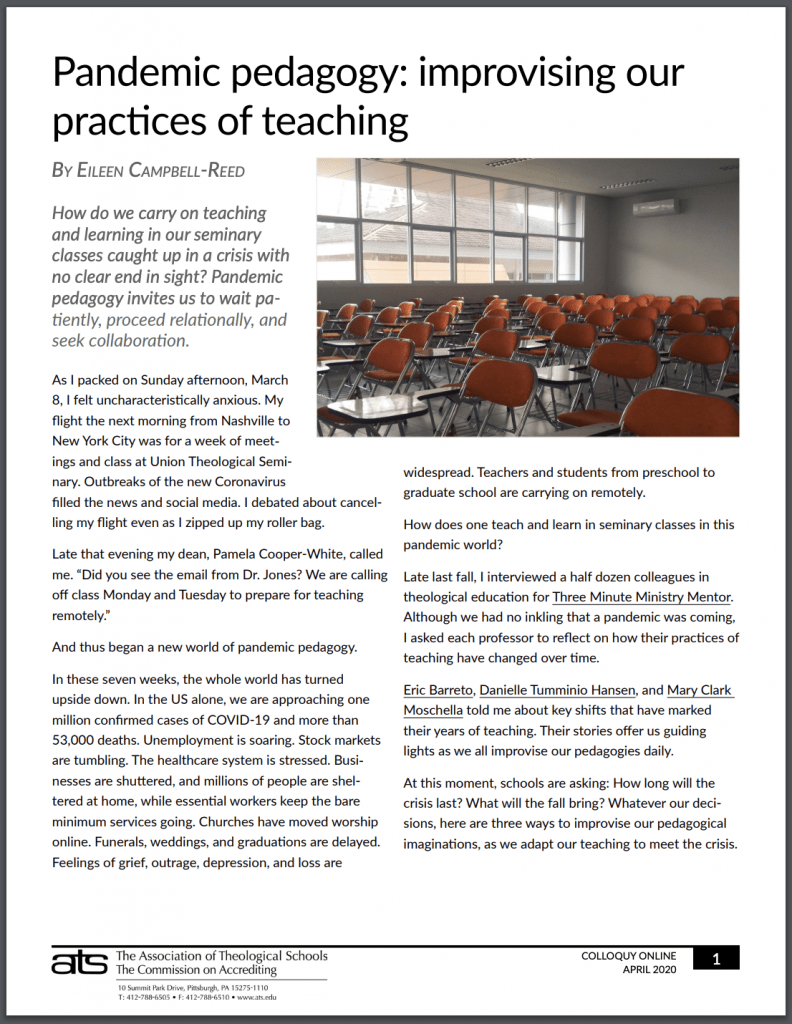Teaching and learning are essential aspects of human development. From parenting to governing, from sports team to PTA, and from ministry to industry, human beings are creatures who can learn and grow from first cry to final breath. How we learn, what we learn and why we learn is unique in each person. The same can be said for teaching.
One of my mentors in graduate school once told me that I was at my best as a teacher when I was focused my curiosity as a learner. For that time I think in my life, I think she was right.
More than a decade later, I would say I’m at my best as a teacher when I am bring an accumulation of know-how from many years of teaching into conversation with the vast array of new things I am still learning.
What about you? How would you say you are at your best as a teacher?
Pandemic Pedagogy
Nearly everyone I know who teaches, and a whole bunch of parents who never planed to teach, find themselves thrust into the new world of pandemic pedagogy.
 Here’s how it started for me, along with some wisdom I gathered up from three of my friends and colleagues. This article was written for Colloquy, a monthly newsletter for seminary professors. However, much of it applies to teachers of all kinds.
Here’s how it started for me, along with some wisdom I gathered up from three of my friends and colleagues. This article was written for Colloquy, a monthly newsletter for seminary professors. However, much of it applies to teachers of all kinds.
In Season Two of Three Minute Ministry Mentor, we’ve been learning from the experience and insights of Eric Barreto, Danielle Tumminio Hansen and Mary Clark Moschella. Fortunately, when I interviewed each of them in November 2019, I asked, “how have your ministry and teaching practices changed over time?” They each shared wisdom about teaching that helps us now in this pandemic moment. The three big ideas they help us to explore are 1) wait patiently and resist fixing; 2) focus on how relationships matter; and 3) let others share the work.
You can watch more of my interview with Mary Clark Moschella in lat week’s episode of 3MMM.
Misunderstandings about Pandemic Pedagogy
For a decade and more, one misunderstanding has persisted: too many people believe that teaching of all kinds could simply be “moved online” with little change in style, timeframe, delivery, or interactions. In this season of pandemic, I hear these same assumptions again.
A better understanding is to consider the situation and make adjustments to the teaching and learning. In crisis times, teachers need to consider the exhaustion and grief that children, parents, college students, and adult learners are all experiencing. Lives have been upended. People are isolated and afraid. Future plans look bleak. In these conditions we need to make major adjustments to our expectations as teachers. And we also need to prioritize listening to our students to help us create learning experiences that work in this unique situation of world-wide pandemic.
Whoever tries to just move their teaching from face-to-face classroom to online, misunderstands how important it is to take in the full situation and make adjustments.#pandemicpedagogy #3mmm pic.twitter.com/xVIOK9KgK0
— Three Minute Ministry Mentor (@3MinuteMin) May 4, 2020
One of the big misunderstandings, and probably short-lived, was that things might actually be easier because we do not have to spend time commuting, packing lunches, dressing up, filling our gas tanks, or catching the bus or subway. Somehow everyone shelter in place was going to make learning easier. I mean what else were we going to do with our time?
It Got Harder Not Easier
Two months into this season of coping with the coronavirus we are getting really clear that that things are in fact harder because we are all home. Tensions and stress are higher. Grief is a constant companion. Childcare is challenging. Essential workers are at risk each day. Lost jobs, income and routines are disturbing our sense of stability and well-being. It is important to be honest about how much harder things are while people are home. Staying home is essential to save lives, and it is also hard on everyone’s lives.
We need to acknowledge that being home in a #pandemic is hard for many reasons: lost jobs and income, childcare challenges, risks for essential workers, fear, stress and grief. Teaching & learning can't be business as usual. #pandemicpedagogy #3mmm pic.twitter.com/FRlrI5BhlG
— Three Minute Ministry Mentor (@3MinuteMin) May 4, 2020
Get to the Point – Don’t Cover Everything
Another misunderstanding arises when teachers try to “cover everything.” Yet trying to cover more in these pandemic days is almost sure to backfire. The “coverage model” of teaching is universally understood to be unhelpful. Yet teachers (me included at times) still want to cover it all when we teach. This is an impossible aspiration even in low-stress times.
A much better approach is to keep teaching preparation brief and focus on the main points of the material. In fact, keeping lessons to a single point will be one of the kinder things you can do for students of all ages. When we keep our own teaching prep brief, we get to what is important and worth remembering quicker. When we can take time to show students how we got from a problem to a solution, our main point becomes even clearer.
How have your preparations changed in #pandemicpedagogy? #3MMM @ecampbellreed #pandemicpastoring pic.twitter.com/JZWYhaqg5k
— Three Minute Ministry Mentor (@3MinuteMin) May 1, 2020
Speaking of limiting main points, we’ve blown past that guideline here. So we hope you will take what is helpful and leave the rest for another day. We are thinking you will!
Later this week we are launching a series on #PandemicGrief. We look forward to sharing interviews with a series of grief specialists to support you in your practice of ministry. We are also continuing to collect grief rituals for this long pandemic season.
Feedback
Our students, peers, and colleagues often ask us to give feedback. However, each situation calls for something different. When we are short on patience and calm, we may rush to judgment that comes across harshly. And reasons for feedback are particular to each case. Additionally, the recipients may be short on patience or feel vulnerable themselves.
I find the following more helpful than telling people what I like or dislike. It is also more helpful than approve or disapprove. And even more helpful than agree or disagree. Try it out and see what you think!
Are you asked to give #feedback to students, peers, colleagues?
Here is a better way.
Thanks @ecampbellreed #PandemicPedagogy pic.twitter.com/8K0TlEM1jt
— Three Minute Ministry Mentor (@3MinuteMin) March 2, 2021




